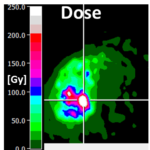HPC User Report from P. Ritt (Imaging and Physics Group, Clinic of Nuclear Medicine)
Nuclear Medicine Dosimetry by Monte Carlo Methods
The aim of the current project is to calculate energy-dose distributions for Nuclear Medicine radiotherapy, using Monte-Carlo simulations of radiation transport.
Motivation and problem definition
In Nuclear Medicine, radioactive substances are administered to patients in order to treat e.g. cancer. The radiation damage to cancer and normal tissues is measured by dosimetry. Currently, dosimetry is carried out on organ level, which means that the average energy dose per organ (e.g. kidneys) is determined. In the future, dosimetry should be enabled on a voxel level, which means that the spatial distribution of energy dose inside an organ could be determined and dose-volume-histograms could be calculated. This is expected to allow for better estimates of organ damage due to radiation. Multiple methods are available for the voxel-wise dose calculation. One method which is regarded as ground truth, is the Monte-Carlo simulation of radiation transport.
Methods and codes
 A GEANT4 based Monte-Carlo simulation (GAMOS) was used simulate radiation transport (mainly beta and gamma particles) in order to determine voxel-wise energy-dose deposition in patients. GAMOS is publicly available. In order to obtain a dose-distribution with high statistical confidence, a large number of decays have to be simulated (about 1010). This is very time consuming if only few CPU cores are available, but can be greatly accelerated when many CPU work in parallel.
A GEANT4 based Monte-Carlo simulation (GAMOS) was used simulate radiation transport (mainly beta and gamma particles) in order to determine voxel-wise energy-dose deposition in patients. GAMOS is publicly available. In order to obtain a dose-distribution with high statistical confidence, a large number of decays have to be simulated (about 1010). This is very time consuming if only few CPU cores are available, but can be greatly accelerated when many CPU work in parallel.
Results
So far, voxel-wise dose distributions of 20 radiotherapy patients were calculated with a statistical standard error smaller than 3%.
Outreach
Accepted: Presentation at the annual conference of the association of Nuclear Medicine Germany (DGN) April 2018.
In Preparation: Multiple conference and journal submissions.
Researcher’s Bio and Affiliation
Philipp Ritt graduated in 2007 at the Particle and Astro-Particle Physics Lab, Department of Physics, FAU. He received his PhD (Dr.-Ing.) in 2012 from the FAU Erlangen-Nürnberg for his work at the Pattern Recognition Lab, Department of Computational Engineering. Since 2008, he works as medical physicist and researcher at the Clinic of Nuclear Medicine and currently is heading the research group for physics and imaging in Nuclear Medicine at the University Hospital Erlangen.
